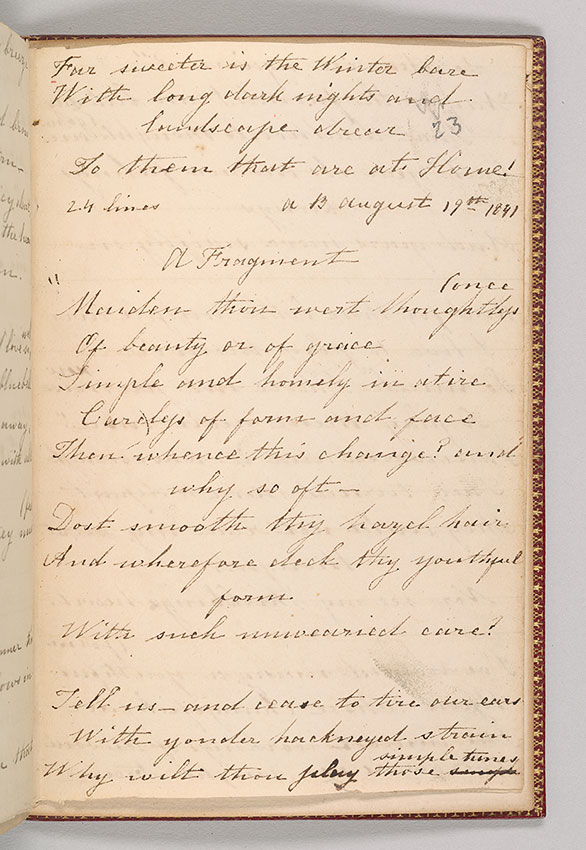
Collection of poems : autograph manuscript signed : [Haworth]
The Henry Houston Bonnell Brontë Collection. Bequest of Helen Safford Bonnell, 1969
“Lines Written at Thorp Green” (pp. 21–23)
Composed 19 August 1841, when Brontë was twenty-one and working as a governess at Thorp Green Hall, near York. First published in Poems (1902), pp. 204–205, with incorrect title “Lines Written at Thays Green.” Poem 16 in Chitham (1979). Note that Brontë wrote another poem with the same title (see Chitham 11).
“A Fragment” (“Self-Congratulation”) (pp. 23–26)
Composed on New Year’s Day 1840, when Brontë was about to turn twenty. This is the only composition in the notebook to be included in the first published book by Charlotte, Emily, and Anne Brontë, Poems by Currer, Ellis, and Acton Bell (London: Aylott & Jones, 1846). Titled “A Fragment” in the manuscript, “Self-Congratulation” in Poems. For publication, Brontë made several revisions, changing the first word from “Maiden” to “Ellen,” for example, removing the Gondal “signature” Olivia Vernon, and revising punctuation. Poem 9 in Chitham (1979); pp. 463–65 in Alexander (2010).
Far sweeter is the Winter bare
With long dark nights and landscape drear
To them that are at Home!
24 lines AB August 19th 1841
A Fragment
“Maiden thou wert thoughtless once
Of beauty or of grace
Simple and homely in atire
Careless of form and face
Then whence this change? And why so oft –
Dost smooth thy hazel hair
And wherefore deck thy youthful form
With such unwearied care?
Tell us – and cease to tire our ears
With yonder hackneyed strain
Why wilt thou play those simple simple tunes
Text as published in Poems (1846)
SELF-CONGRATULATION.
Ellen you were thoughtless once
Of beauty or of grace,
Simple and homely in attire,
Careless of form and face;
Then whence this change? And wherefore now
So often smooth your hair?
And wherefore deck your youthful form
With such unwearied care?
Tell us—and cease to tire our ears
With that familiar strain—
Why will you play those simple tunes
| Attachment | Size |
|---|---|
| 20.04 MB |
